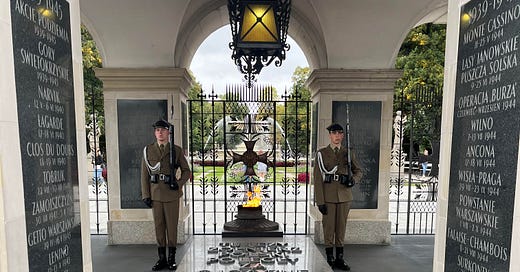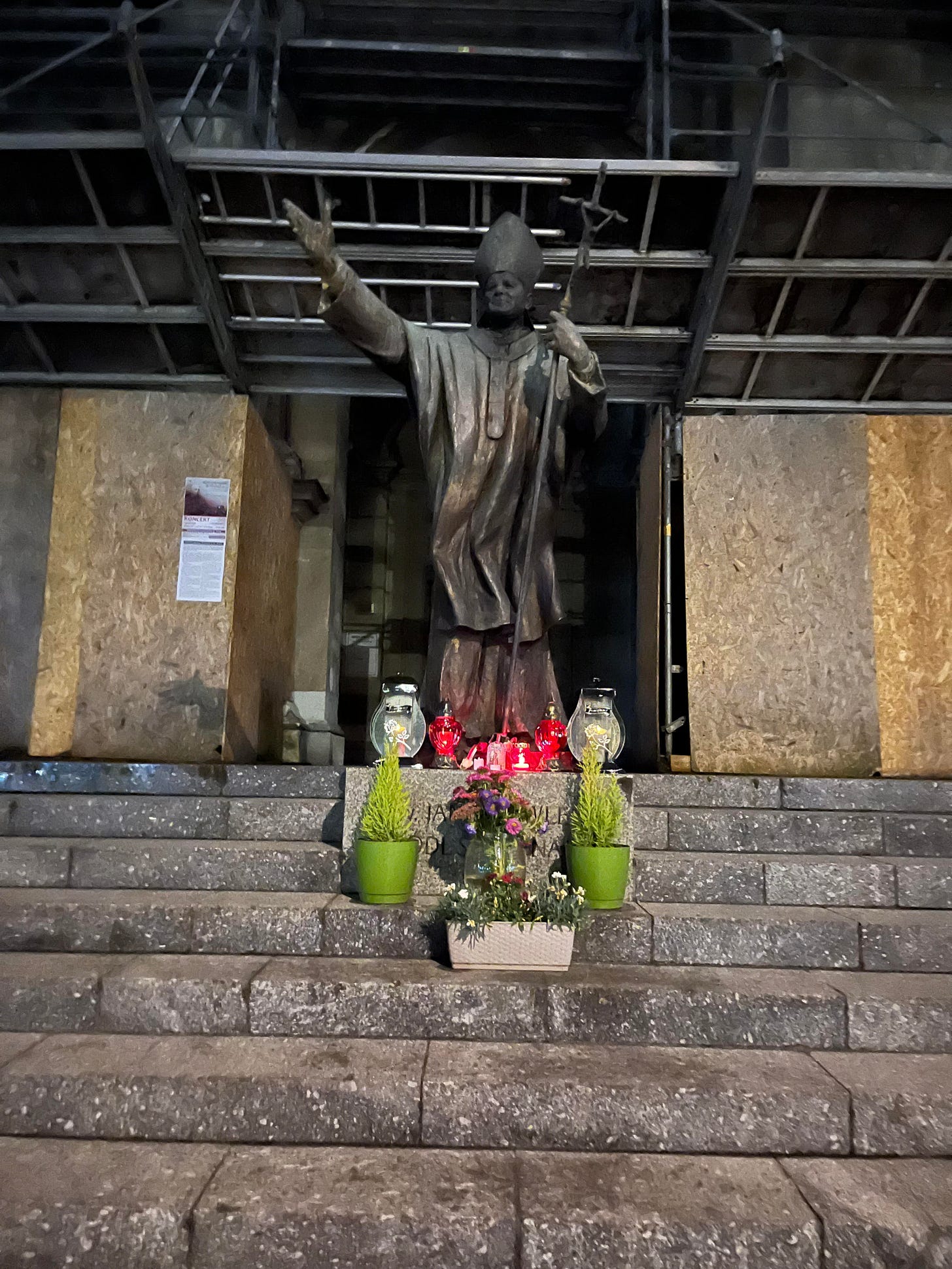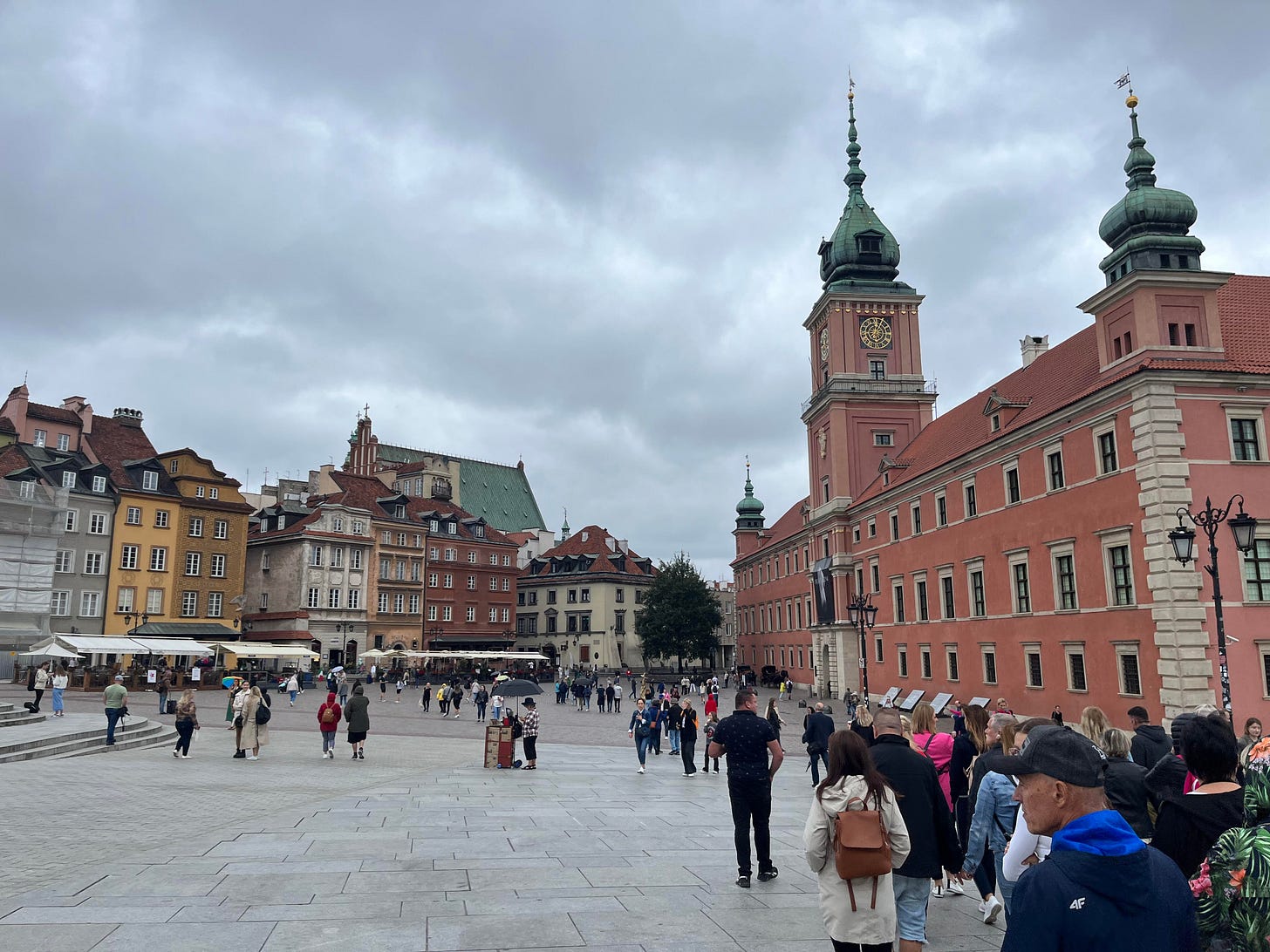Poland has a particular romantic attraction for a certain type of British person, me included. Embedded in the historical memory is the heroic tale of the pilots who helped save Britain from Nazi invasion. Further back in history, it was Poland’s dashing cavalry who turned back the Ottomans at Vienna. In the small, pretty town of Tarnowskie Góry outside Katowice I even saw an inn where Jan Sobieski stayed on the way to beating the Turks. Based Poland.
And in living memory for many people, it was Poland that overcame the misery of communism through the Solidarity trade union, its immense faith bolstered by the Polish pope John Paul II – culminating with a free election in 1989 which started a chain reaction bringing down the entire Eastern bloc. While in Warsaw I visited the Museum of Life Under Communism, although the first time we tried there was an enormous queue to get in, which seemed a bit too authentic
The memory of Jan Paweł II is still visible in the Polish capital – street names, statues, and images in windows – and Poland is still conservative in many ways: there are blasphemy laws protecting Christianity, and here musicians who attack religion are still rebels, rather than just an embarrassment (whereas in Britain we have newer, more draconian, blasphemy laws protecting identity).
Poland still has the strictest abortion laws in Europe. You don’t smell weed – a fragrance now depressingly ubiquitous in Britain – even where young people gather in the city. Street drinking is illegal, and even jaywalking will get you a 100 złoty (£20) fine, a law that is widely observed. But the biggest difference with western Europe is that the country is not at all multicultural – yet.
But many in the West seem to have a distorted view of Poland as being more traditional than it actually is. In reality church attendance is plummeting, the young are alienated from religion, and younger women in particular are embracing Anglophone progressivism in all its forms – and in this Sunday’s election are expected to vote en masse for the Left.
The life portrayed in the Museum of Communism is a world away from the country now. According to one calculation, in the last three decades ‘Polish GDP has grown by more than 900 per cent, the best in the history of the OECD, just next to South Korea’. The country has surpassed Greece and Portugal in GDP per capita and will soon pass Spain and Italy. There is even speculation that it will overtake Britain in the next decade.
Although nothing like as extreme as Russia, Poland suffered in the transition from communism, with unemployment, alcoholism and a surge in violence: murder rates peaked at 5 per 100,000 in the late 1990s, the result of an explosion in organised crime, and restaurant goers sitting down for dinner might even witness someone getting shot in the head. Unlike in Russia, the Polish authorities were able to take control of this disorder while the country successfully transitioned to a market economy and democracy. The gangsters were all locked up and by the mid-2010s the homicide rate had fallen by almost 90 per cent – a per capita rate around half that of Britain and a tenth of the US.
Many things have changed, even in the past decade. Customer service in restaurants has become more attentive, hardly surprising as wages have risen sharply; people smile more; its notorious roads are much safer. But as Poland has become wealthy, it has also begun to suffer from all those good problems familiar to middle-income countries, with productivity being outpaced by wages. It now finds itself in a quandary where it must increase productivity – which requires investment – or increase the labour supply.
Despite this new-found wealth, all is not well. Young Poles are very pessimistic at the moment, only ahead of the Spanish among European Union members; and while rising post-pandemic youth unemployment plays a part, there is considerable literature linking religious belief and well-being.
Although in the streets by Warsaw’s Old Town smartly dressed families can be seen heading to Mass, the country is undergoing rapid secularisation, comparable with that of Spain or Ireland. The proportion of people identifying as Catholic fell to 71 per cent in the latest national census, down from 88 per cent a decade earlier. There is a lot of anger against the Church, with one poll finding that among young Poles, only 9% view it positively.
Chalking the door, the January tradition of priests coming around to bless people’s homes, has declined. Halloween has become a party night as in other countries under American cultural influence, which makes for troubled heads for 1 November, the day when Poles traditionally carry wreaths to the graves of loved ones, a very moving sight to see.
Declining religion also loosens ties in other ways, between generations and gender. The sex divide in politics, already visible in Anglophone countries and most extreme in South Korea, is also clear among young Polish voters.
Poland is divided on economic and social issues, and geography, with voting patterns matching the old divisions between Germany and Russia, especially visible in the election of 2007.
But Poles are especially divided by age and sex. The two mainstream parties, the ruling national-conservative Law and Justice Party, PiS (pronounced like ‘peace’, it should be noted) and the centre-left Civic Coalition, or PO, have quite an old following. In contrast, young women tend to vote for the more radical Lewica – ‘The Left’ – party, and young men for the far-right Konfederacja. But young people are also quite small in number, a result of the country’s persistent low fertility, and much less likely to vote.
Both younger parties have a strong social media presence, and Confederation leader Sławomir Mentzen is the most followed Polish politician on TikTok, while his party also uses pro-wrestling imagery to attract young men.
Mentzen is only 35, last year replacing the 79-year-old Janusz Korwin-Mikke; his colleague Krzysztof Bosak is 41. Lewica’s six-person leadership team includes three under 45s. In contrast, Donald Tusk is 68 and PiS leader Jarosław Kaczyński is 74.
Abortion is obviously a great concern among young women, with massive protests in the past year against the country’s strict laws. The gender issue is also growing in importance, with many teens now identifying as trans, although official numbers are hard to estimate. Opposition leader Donald Tusk ‘has pledged to simplify the gender-recognition process for trans people and introduce same-sex civil partnerships’ if he wins, saying that LGBT people are a ‘victimised minority’
Despite this, PO recently removed an activist for stating that she would support terminations at any stage, and who instead became a candidate for The Left, which wants abortion legalised up until the twelfth week, the introduction of a 35-hour working week, and a house-building programme.
The Left supports ‘introducing civil partnerships, marriage equality, simplifying the gender recognition procedure … protecting gender identity and sexual orientation in hate crime laws, and banning so-called “conversion therapy”’ – all very familiar.
Anglophone-style liberal cringe has also crept in; when The Left unveiled three female co-leaders to join its existing three male ones, they declared ‘We’re like the Avengers. We have superpowers and no one will stop us.’
Poland’s young are now more left wing than the old, which they haven’t been since communism, and young women considerably more so. Three-quarters of young women support same-sex civil partnerships, compared to about half of young men. Such is the sex division that left-wing politicians tell women not to sleep with men who vote for the Right, like a modern Lysistrata.
PiS have ruled on a platform that in some ways resembles ‘post-liberalism’, with conservative social policies and a generous welfare system. Poland’s pension system is driven by a feeling that older voters who endured communism and weren’t able to make money deserve support. (This was once the thinking in Britain, that the older generation had endured the War and its horrors, though it’s starting to look a bit more dubious for pensioners who grew up in the 1960s and lived through the property boom.)
So while heretical Conservatives in Britain want the party to attract disaffected voters by adopting more left-wing economic policies and right-wing social policies, Confederation is more free market than PiS, proposing ‘wide-ranging tax cuts and the ending of many forms of state social support’. In fact, younger men often grumble that their taxes are being squandered on welfare, especially pensions and child benefits. Unlike in Britain, their economic liberalism is seen as anti-establishment (and popular in a country which is pro-capitalist). Although the party has tried to downplay some of its previously more extreme rhetoric, Confederation’s platform of hostility to immigration, scepticism towards European integration, and support for neoliberal economics makes it the closest thing to a Powellite party in Europe.
But even Poles who are socially liberal are not entirely on board with everything in western Europe. There is also some disconnect between social and cultural conservatives, so that many young people who are progressive on social issues like abortion are still not keen on immigration.
Yet, whoever the Poles vote for on Sunday, more immigration is what they are going to get.
Part 2 will be published tomorrow. Many thanks to my friend Ben Sixsmith for showing me around Poland; if you don’t already subscribe to his substack, you should.







And there was me thinking Ed would finally return full of hope and optimism...
There seems to be some iron social law that states that the good life is always followed by runaway foolishness. Wouldn't it be nice if beyond this stage there was an expansive conservative upland where no one claimed to be non-binary or dyed their hair pink? But experience seems to tell us that all that lies beyond is disorder and reprimitivisation. Poor Poland. They still have decades of slow social decay to go through and then get used to. The only consolation is that humans soon get used to pretty much anything and adapt.